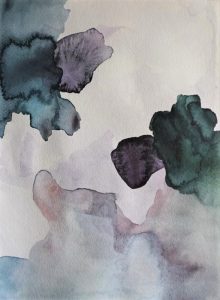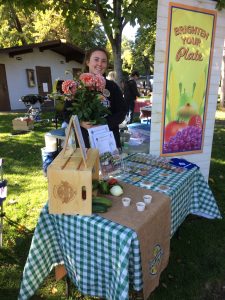By Alexandra Ferrara
RARE has allowed me to meet some really special people. That is all there is to it.
Okay, just kidding. That is a huge part of my experience, but there is some more to it.
Recently, I was having a conversation with one of those special people I met through RARE about painting with watercolors. I mentioned that after spending the past four years of college drafting in a design studio (where EVERY last detail had to be perfect) I started using watercolors to learn to let go of feeling the need to have complete control in my art.
last detail had to be perfect) I started using watercolors to learn to let go of feeling the need to have complete control in my art.
My statement about watercolors sparked a reflection about my life and how I have learned to feel comfortable letting go of control. Like a rush of water, I began recalling all these moments where I let go of the illusion of control I held and received results that were beyond anything that I could ever have expected. Before moving to Oregon, I lived in the same Midwestern town for my entire life. All twenty-two years of it. Applying to RARE, eventually being accepted to RARE, and knowing that I would be moving 2,000 miles away to work for the Independence Downtown Association bred some of those first, serious moments of actively letting go of my desire to control the situation. Thoughts would flow into my head, I would remind myself that it will happen how it happens, and then they would flow back out. This practice has stuck in my life ever since, but not always smoothly.
Quick disclaimer: this anecdote is a dramatized story from my head. On the outside, it probably looked and sounded like everything was perfectly fine. And thinking back on it, it really was not that bad. But for the sake of my point, I am going to tell it anyway.
My first couple of weeks were rough. One of my tasks given from my supervisor was to simply “get out and meet people.” I am not usually one to get out and meet people… if we are being honest here, I am usually one to stay in and avoid people. Because of this, I wasted so much energy on trying to predict what would happen during my first couple attempts of introducing myself to downtown business owners. I expected a certain outcome for a situation that I had no possibility of being able to predict. Quickly I realized that this was hindering my experience. I needed to stop wasting my time with these thoughts. I knew coming into this position that it was going to involve people – communicating with people is a key aspect of Main Street work. And I pursued this position because I wanted to challenge myself, but I was not allowing that to happen. Once I dropped the feeling of needing control, I felt more confident in introducing myself, my conversations started flowing better, and the interactions that I had felt more genuine.
This small and, frankly, silly moment has set the stage for the rest of my experience. In my ability to let go of control, my community has been able to grab hold of opportunities and run with them. And while they are running with them, I am standing by, cheering them on, and being there as a resource, but letting them guide their own interventions. I have learned to embrace the unknown and trusting in myself and my community has made my experiences during RARE incredibly impactful and unforgettable.
A bit about Alexandra Ferrara:
- Currently serving as a Downtown Manager for Independence Downtown Association
- Bachelor of Science in Interior Design with a Minor in Urban Studies, Illinois State University, Spring 2017
- People may be surprised… “I have spent over one hundred hours volunteering during my college spring breaks alone.”
Does community development work interest you? Are you looking for a life changing experience in rural Oregon? Learn more about serving with the RARE AmeriCorps Program via our website: https://rare.uoregon.edu/application-process/member-application-process/
